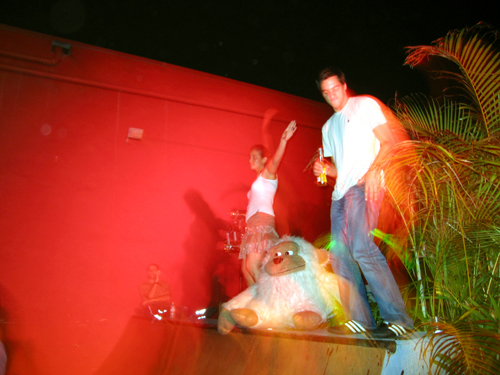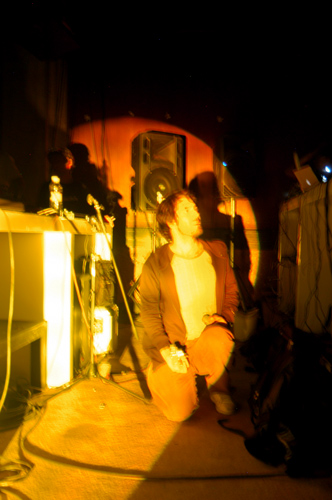May 18, 2005
Listening to the opening track from Man Recordings' Não Wave compilation of Brazilian new wave and post-punk, it's easy to believe that in the 1980s, the phaser had the same kind of globalizing power that the snare roll does today. Agentss' "Agentss" plows through gelatinous chords that echo the Cure's Seventeen Seconds or Faith, thanks to the whooshing of the guitar pedal. (Why did people love phasing so much in the '80s? Was it the way it tinges everything smog-colored and slightly seasick that echoed the Reaganomic mood?)
The song is way weirder than just some Cure imitation, though, and not only for the half-spoken/half-yelped lyrics or the C3PO vocoding (funny that Fluxblog heard, instead, R2D2). Just check the Doors-like organ breakdown after the bridge. These cats weren't grey; more like gothadelic, and totally louco.
May 12, 2005
Minimal pasta

Whether you buy Spin about as often as you pick up Hummel Figurine Digest, or whether you've got all of your back issues shelved chronologically and indexed in a computer database, you need to buy this month's issue for Adrienne Day's kick-ass piece on Kompakt, which is pretty much the definitive story of the label in 2005.
That is, of course, unless you don't care for Kompakt — in which case, may I suggest you go here. (Just kidding.)
*The above photograph bears no relation, implicit or ex-, to Spin magazine, its advertisers, or shareholders, nor to Kompakt, Adrienne, nor anything else, really (although I did meet Sia Michel at the party where this photograph was taken, for whatever that's worth). Sometimes ravers and their plush toys just deserve to be seen in all their gurning glory by sober folks sitting at their desks on a Friday morning.
May 11, 2005
We like tambourines

The rumors were true: I've got a new monthly column up at Pitchfork, part of the rotating stable of genre-focused whinniers including Dave Stelfox, Jess Harvell, and Martin Clark. (What are they going to do in months with five Wednesdays, have us thumbwrestle for stylistic dominance?)
Of course if you're visiting this blog today, you probably came from Pitchfork, in which case greetings. For your diligence, a bonus. In the column I forgot to mention the sing-songiest track of them all, Captain Comatose's "To My Song," which you can download at that link right there. The good Cap'n — a collabo between Khan and Snax — have come up with the party jam of the summer, all pistoning pianos and overdriven whiteboysoul howling, and that chorus! Woo-hoo. It's like Superpitcher's version of "Baby's on Fire," but hopped up on poppers, which makes sense, since the whole album (on holy Playhouse) is reportedly an ode to amy nitrate. I never even really undertsood what poppers do, being sort of ex-straightedge and all, but based upon that all-up-in-your-frontal-lobes throb, I think I get it.
You will be hearing this everywhere this summer: clubs, festival tents, rooftops, basements, helipads.
May 10, 2005
10 tracks you already love
Jena Paradies has posted a 45-minute mix that's simply delish. Pantha du Prince, Superpitcher's MFA mix, Dub Taylor, Sami Koivikko, Phonique, Ellen Allien... drizzly beats for a grey spring day. Download it here.
May 06, 2005
I'm Alamazed
While driving from my parents' house to the mall last December, I heard a song on the radio that almost caused me to drive their car right off the road. It was R&B, but it sounded unlike any other R&B in the pop radio spectrum — spookier, synthier, not unlike the warbly German techno I tend to favor, really. Organs hovered in the middle distance of the FM waves like echoes of Lawrence or Superpitcher — others have even compared them to This Heat — and the molten ride cymbals sounded as sour as Closer Musik's. The drums boomed deep enough to make "The Whipser Song" sound wispy. And despite saucy lyrics ("Doncha wish your girlfriend was hot like me/ Doncha wish your girlfriend was a freak like me") — and the fact that the whole song was adapted from Sir Mix-A-Lot's "Swass" — the singer's alternatingly hectoring and defeated tone dragged the song to abject depths rarely heard in pop. What the fuck was this doing on a station that announced itself, in a subwoofer-assisted voice, as "Portland's party station!"?
When I got home, a few minutes of research on the web revealed that it was a Cee-Lo production, sung by a mostly unknown vocalist (and former aesthetician) named Tori Alamaze. The track was already on the P2Ps, so I downloaded it, wrote about it, and waited for a buzz to build.
It never did, aside from a few bloggers and the ILM board (predictably). The single was released on vinyl in March, but with no attendant press push — aside from what I'm told was a brief puff piece in Vibe. You could buy a ringtone, but there was no video. (Though judging from the P2Ps, the tune made it onto at least a couple of mixtapes.)
Now, suddenly, the song is back, but with a twist. Tori Alamaze is no longer the singer — she's been replaced by a Vegas burlesque group called the Pussycat Dolls, and the ubiquitous Busta Rhymes drops in for a tacked-on rap. (Does he even record his own songs any more? His cameo-to-original-productions ratio must be going on vertical.) Cee-lo's production is almost identical to his original, but he tacks on guitars, percussive fills, and obtrusive horns that mar the crystalline glint of the original. The whole thing, in fact, feels tacky; Busta's superfluous rap bores a hole in the hermetically-sealed vibe of the Alamaze version, letting all the pathos leak right out. (Here's a hint, hit-men: some songs don't need a rap. Sounds crazy, but it's true.) And the Pussycat Dolls don't bring anything new to the song, despite their obviously distinguished lineage. They sound, in fact, almost exactly like Tori Alamaze, down to every last inflection — every sigh, accent, and elongated syllable. They couldn't sound more like Alamaze if they were samplers. (Why, in any case, do they need six women — that's how many are pictured in the promo photo — to sing a solo tune? Are five of them even audible?)
So what's the story? My suspicion is that Alamaze's version wasn't selling or charting fast enough, so the label decided to re-release the song with hotter vocalists — the multiracial, miniskirted, mirror-shaded Dolls look a bit like a hybrid of Kylie, the Spice Girls, and M.I.A. — and Busta,who seems to be the hip-hop/R&B equivalent of the Hollywood screenwriters hired to spice up six lines of dialogue in over-budget blockbusters. And of course, the "Doncha wish your girlfriend was hot like me" sentiment is pretty much tailor-made for a crew of fishnet-clad Caesar's teases. What gets lost is the sadness of the original; in Alamaze's version, you don't know what she looks like; her voice has to do all the cajoling. She's a seductress, yeah, but there's something else behind it that resists naming — some emotion that's one part envy, one part resentment, three parts reverse-Schadenfreude, with a secret ingredient for good measure. That's all gone now, in favor of steam-tray immediacy.
The moral? There may not be one, except that the fickle majors don't seem to care much about throwing away one of the year's perfect songs. Look for the pictorial in a Maxim near you.
Addendum
The only thing worse than the Pussycat Dolls version is the uncredited reggaeton remix that's floating around on the P2Ps; the dancehall rhythm is totally out of key with the vocal, and you find yourself wishing you could just teach the remixer about Ableton Live's pitch adjustment feature. Still, as cringeworthy as it is, there's at least a vitality there — a sense that the remixer heard something special in the song and made it his own. (Full disclosure: I did my own mashup of it too.) It doesn't matter that the rhythm's breakdowns aren't synched with the verse and chorus, and it doesn't matter that the vocal and instrumental seem to have been recorded not just in two different keys, but two totally separate universes. After all, Tori's vocals wouldn't know perfect pitch if it smacked'em on the head with a tuning fork. The whole song is about a disconnect, and in Tori and Cee-Lo's original, they bring the rift to life. In the Pussycat Dolls' current remake, it's the song's handlers that draw a line: taste, talent, and mystery on one side; fourth-quarter projections (or perhaps just sheer bone-headedness) on the other. Log the loss in red ink, and fade to black.
May 04, 2005
Hell freezes over
A veritable feast of Kompakt track reviews, Jess Harvell on DJ mixes, Dave Stelfox with a new monthly column on dancehall: it's not your little brother's Pitchfork. (And wait, what's that? A cryptic "coming soon" note after Stelfox's column? Somebody pinch me, please....)